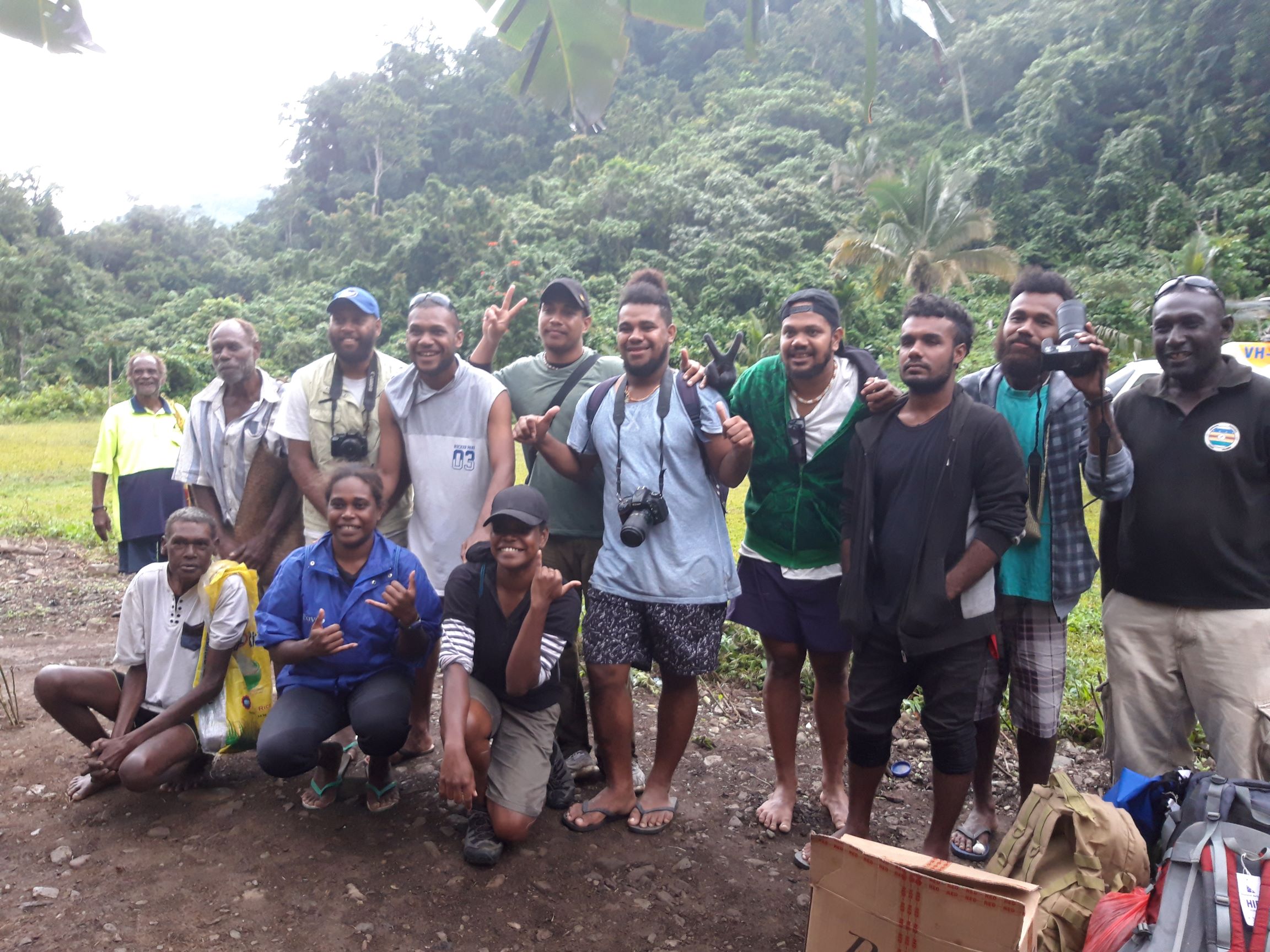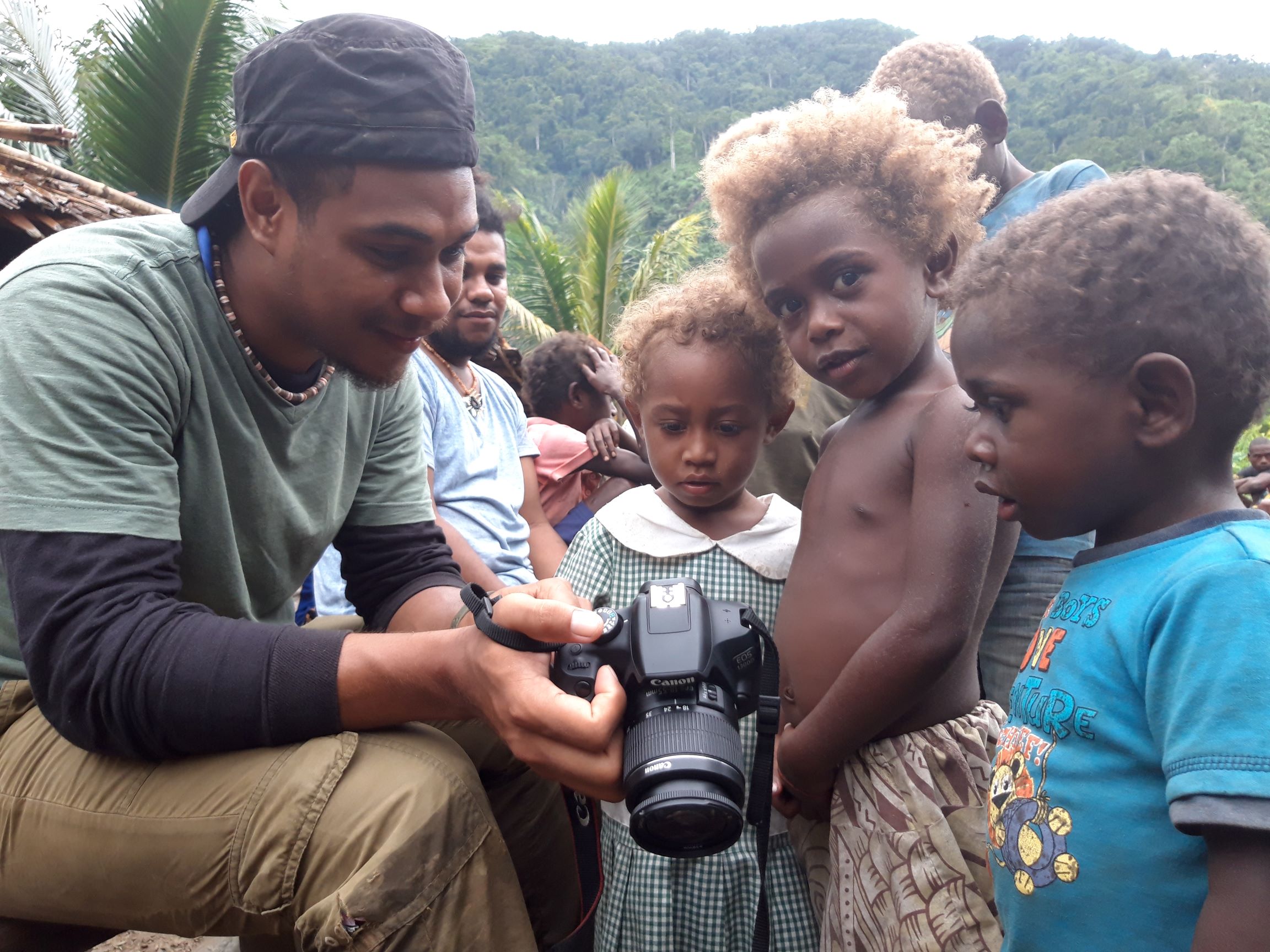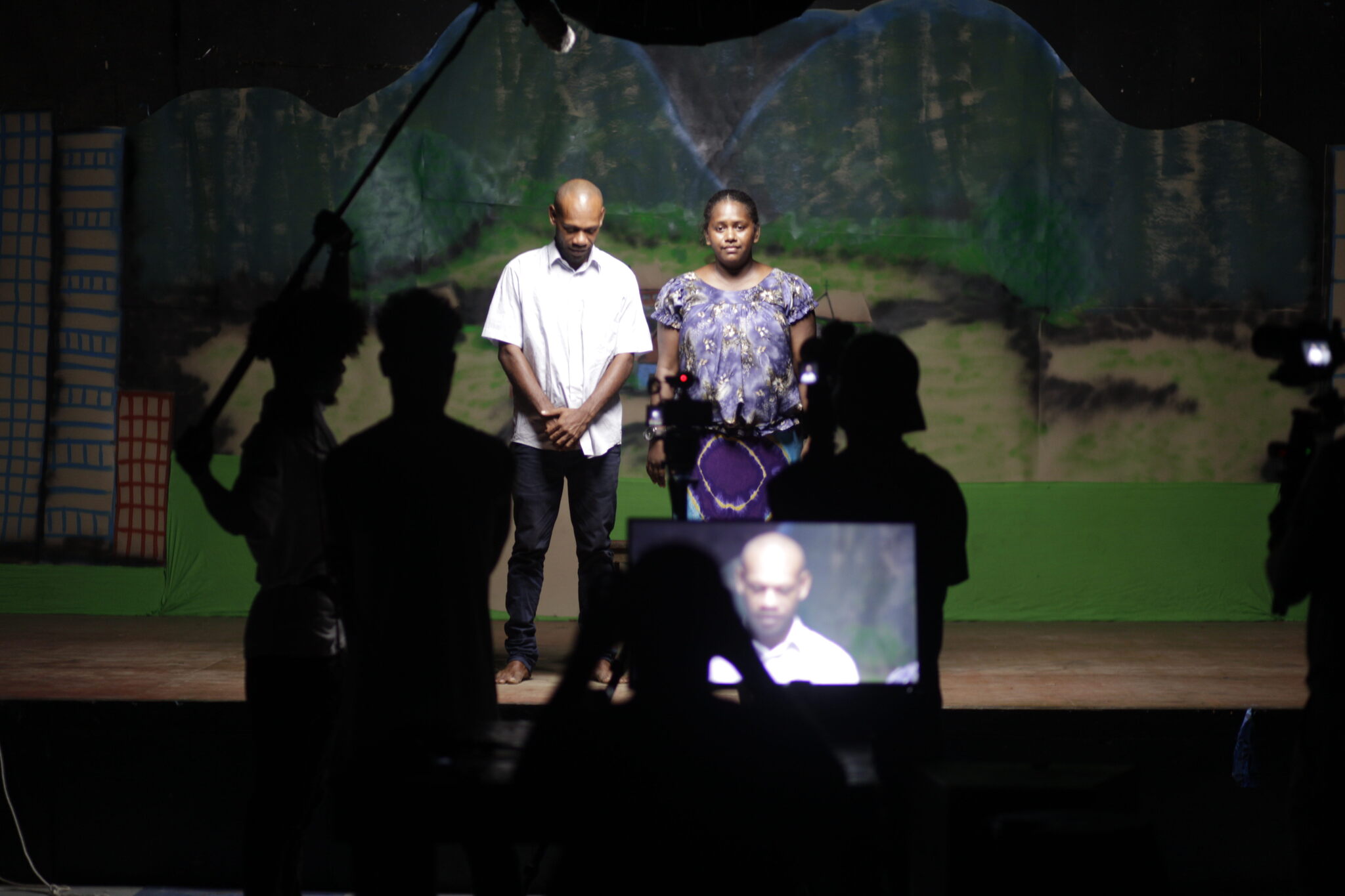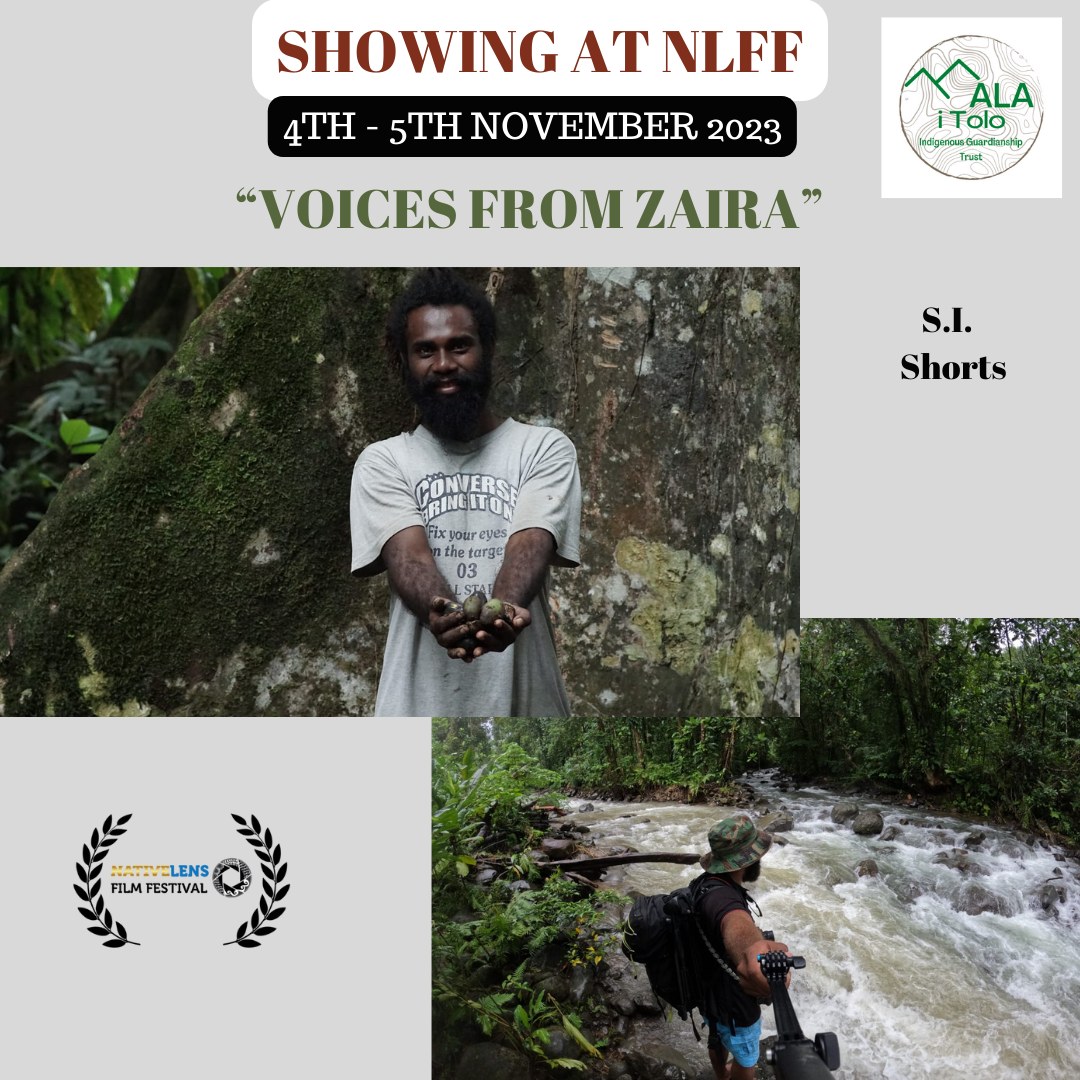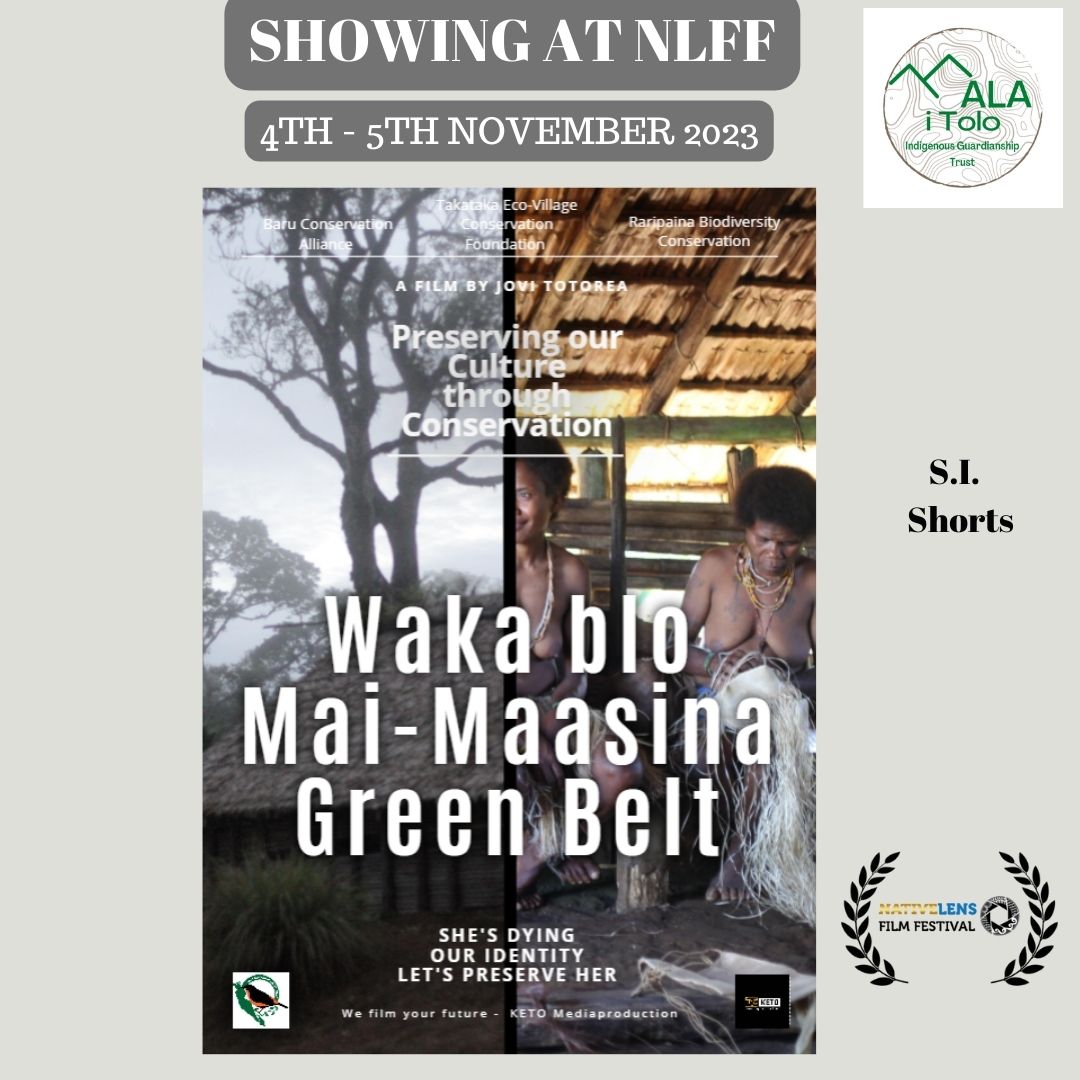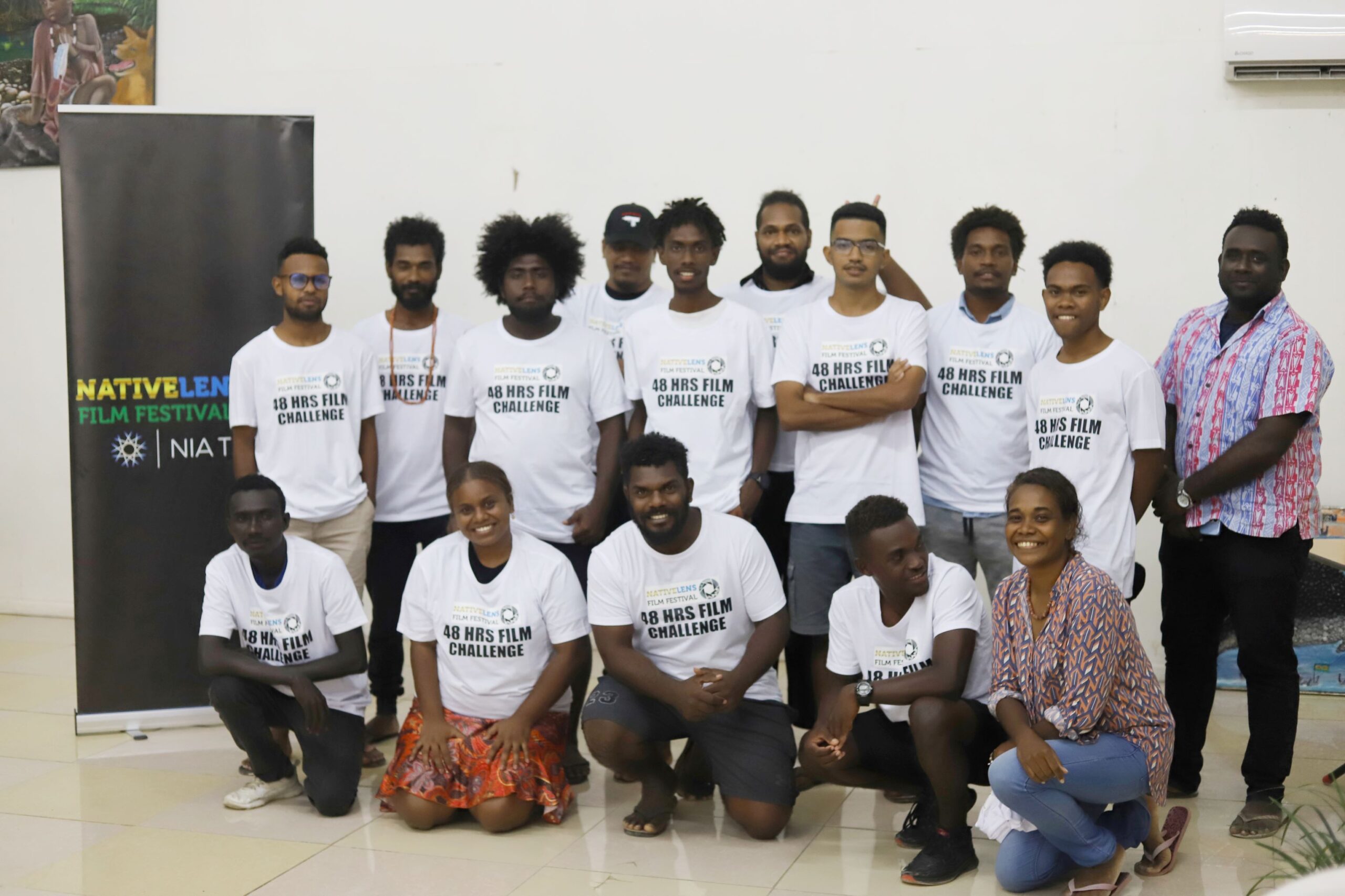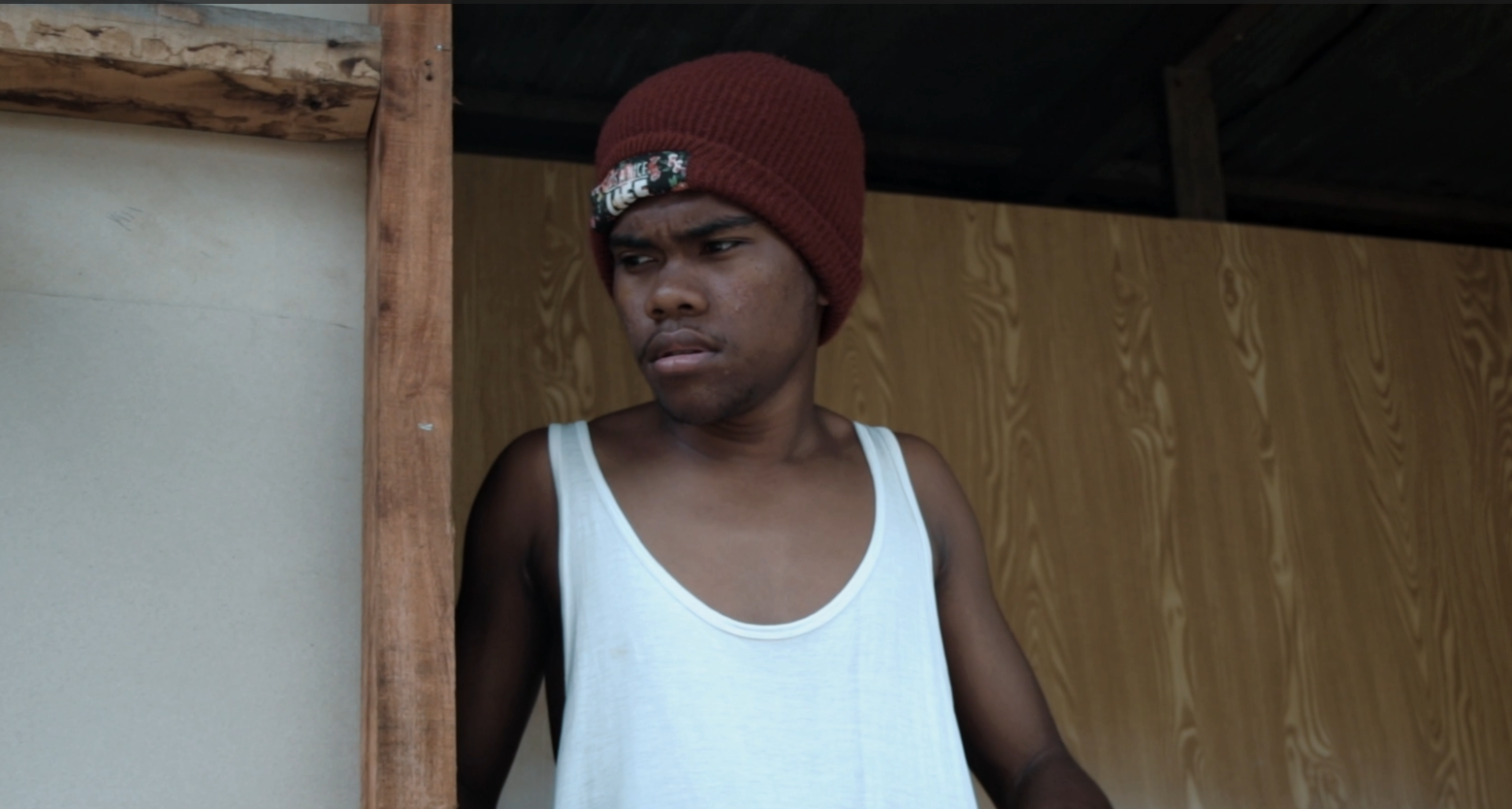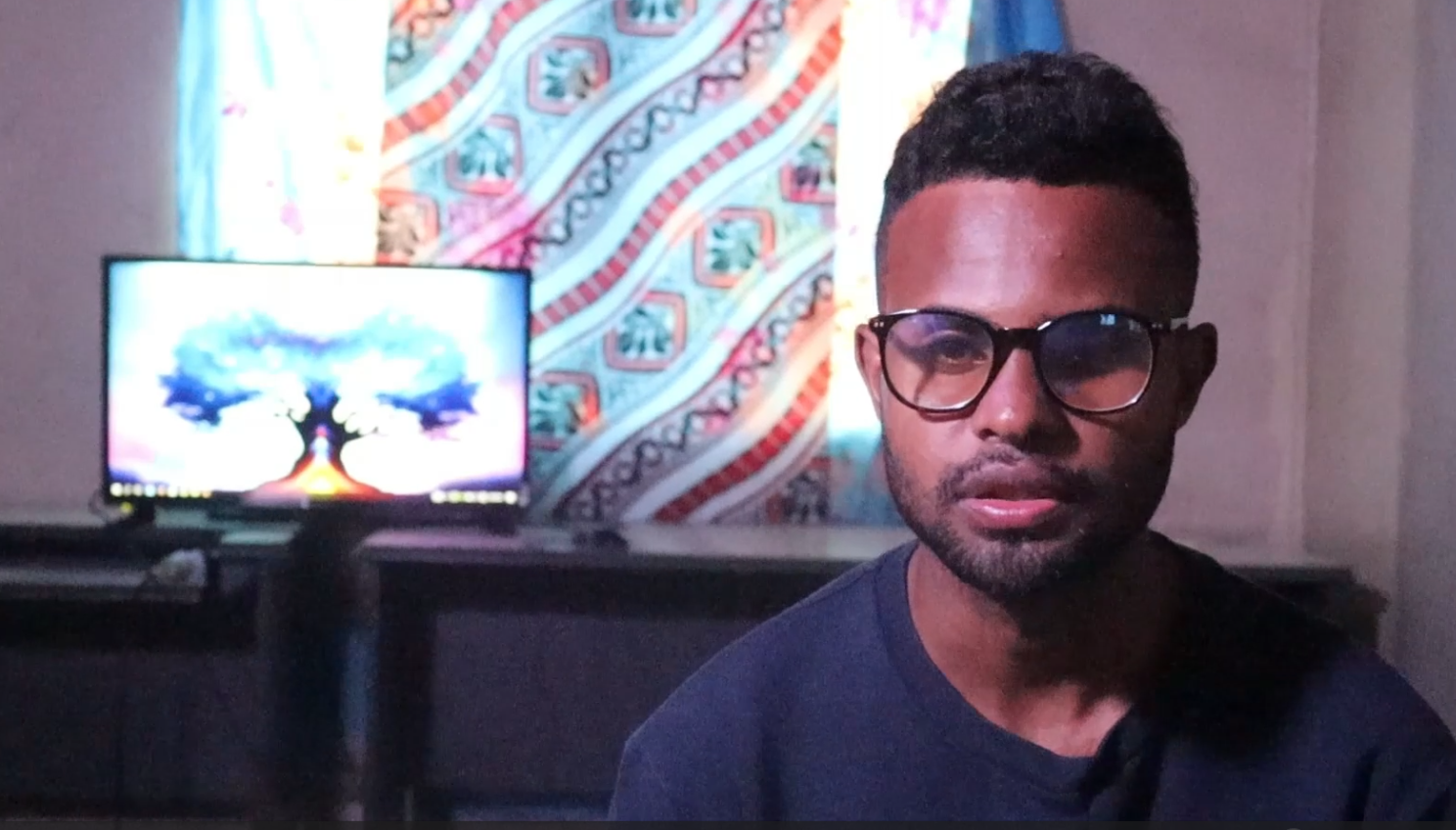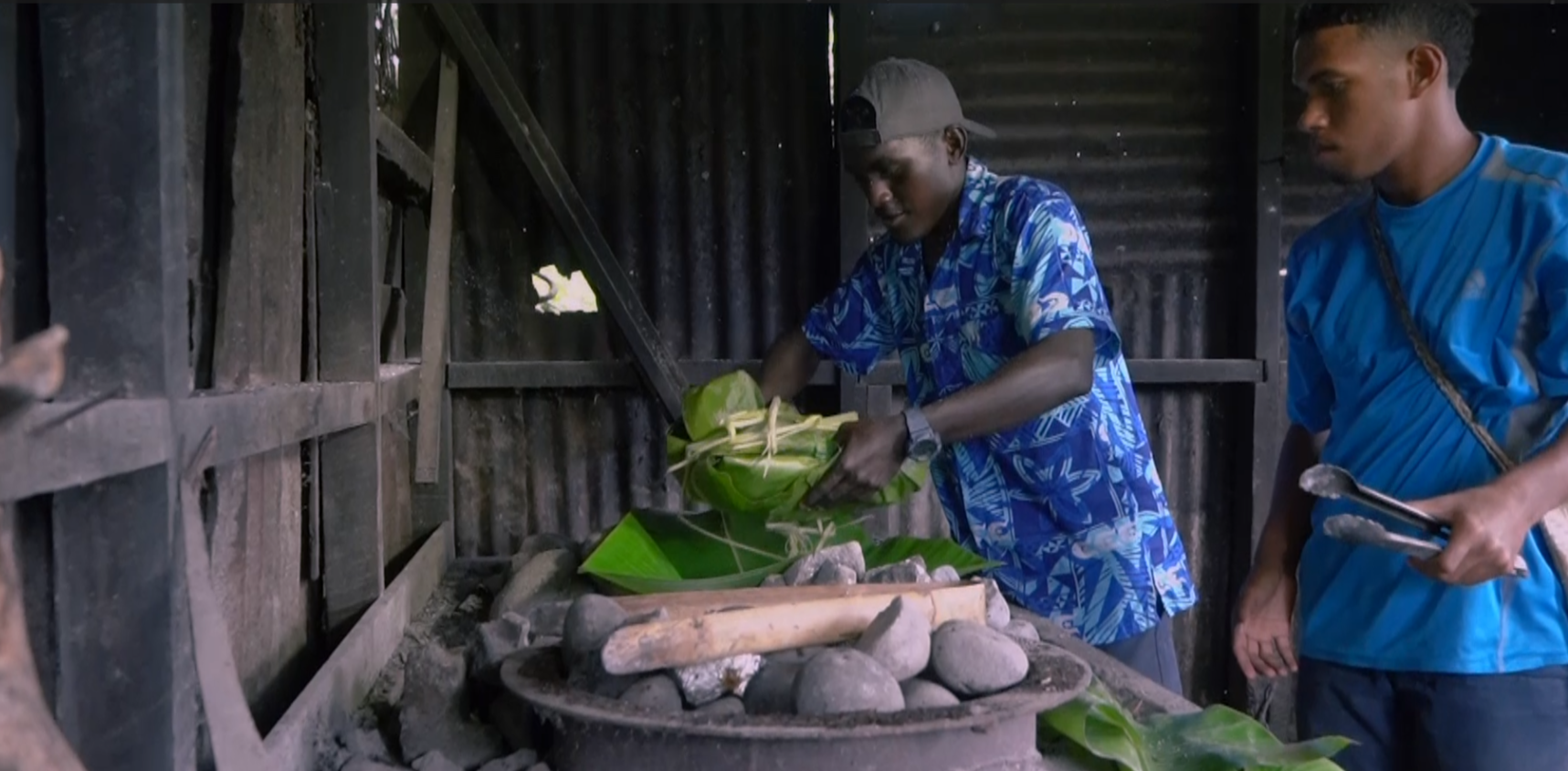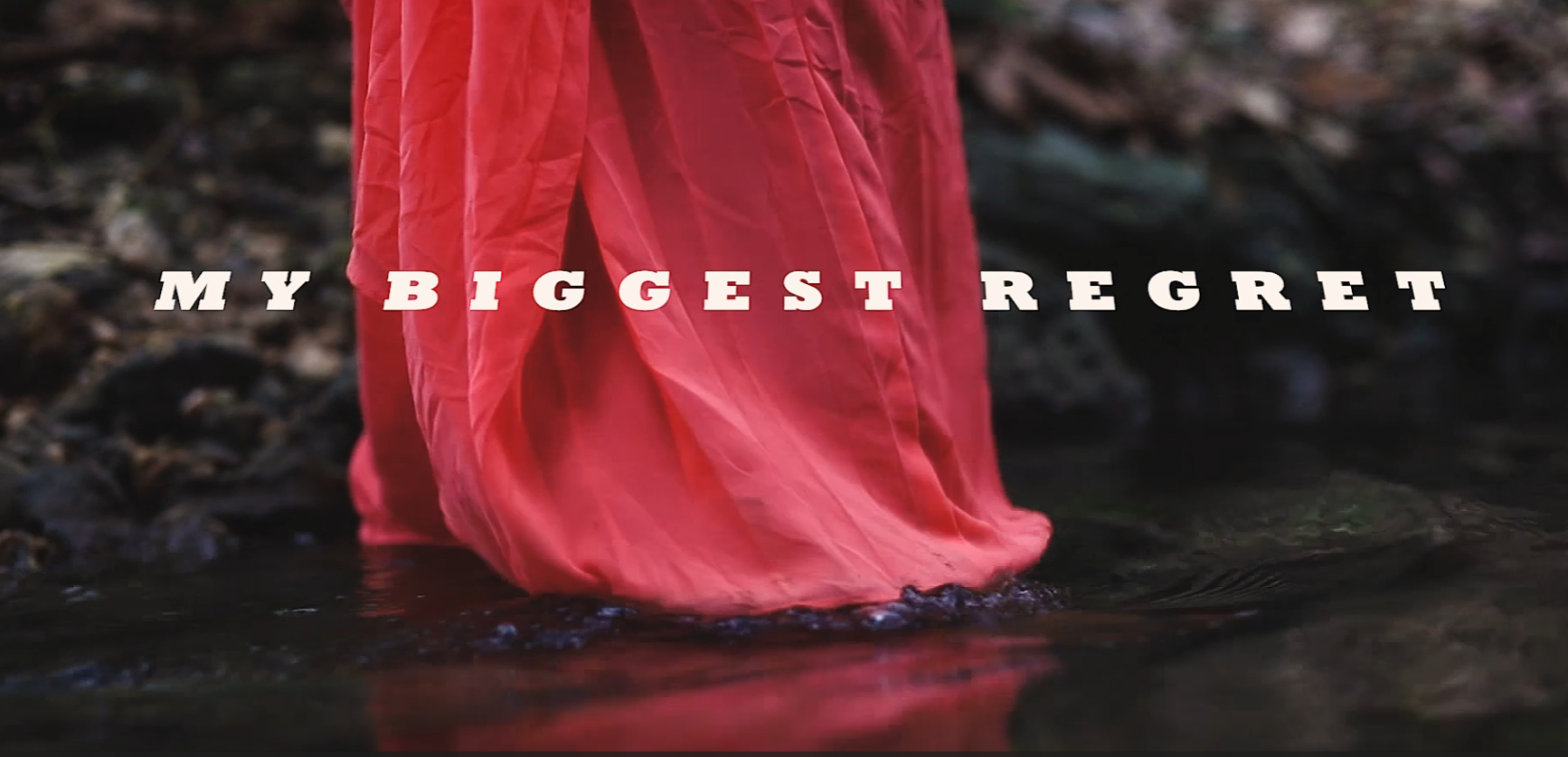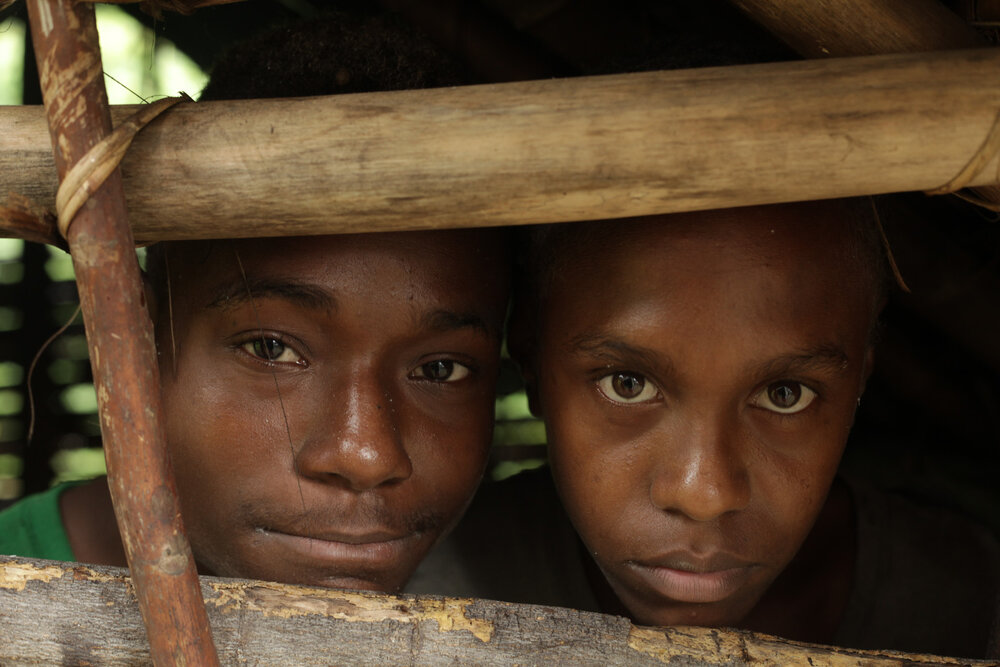 Sky Aelans (production still) 2021 / The short film highlights the vital bond between the communities of the Solomon Islands and their sacred high mountain forests, known as the ‘Sky Aelans’ / Digital, colour, sound, 7 minutes, Solomon Islands, Solomon Islands Pijin / Directors: Jeremy Gwao, Daniel Kakadi, Georgianna Lepping, Regina Lepping, Manner Levo, Junior Patrick Makau, Edward Manuga, Zahiyd Namo, Neil Nuia / Producers: David Boseto, Edgar Pollard, Daniel Lin, Tracy Rector, Rob Lau / Editor: Nick Stone / Image courtesy: Regina Lepping
Sky Aelans (production still) 2021 / The short film highlights the vital bond between the communities of the Solomon Islands and their sacred high mountain forests, known as the ‘Sky Aelans’ / Digital, colour, sound, 7 minutes, Solomon Islands, Solomon Islands Pijin / Directors: Jeremy Gwao, Daniel Kakadi, Georgianna Lepping, Regina Lepping, Manner Levo, Junior Patrick Makau, Edward Manuga, Zahiyd Namo, Neil Nuia / Producers: David Boseto, Edgar Pollard, Daniel Lin, Tracy Rector, Rob Lau / Editor: Nick Stone / Image courtesy: Regina Lepping Solomon Islands is an archipelago nestled in the south-west Pacific Ocean, situated approximately 2000 kilometres north-east of Australia. Its sprawling land mass encompasses nearly 1000 islands grouped into nine main clusters. The bustling capital, Honiara, is perched on Guadalcanal, the largest and most prominent island in the nation. The population is predominantly Melanesian, with smaller communities of Polynesians, Micronesians, Chinese and Europeans adding to its rich cultural tapestry. The country boasts an impressive array of languages, each accompanied by numerous local dialects, and while English serves as the official language, Solomons’ Pijin is the widely spoken lingua franca.
Achieving independence from Britain in 1978 — though still a member of the Commonwealth — the country is still navigating its governance within the Westminster system, a stark contrast to its traditional village leadership and chiefly structures. Much of Solomon Islands’ history was first documented by foreign anthropologists, marking a shift from indigenous oral traditions to recorded narratives under the influence of colonialism and Christianity. This transition, while positive for religious dissemination, has had complex repercussions on social connections and the preservation of indigenous storytelling. In recent decades, the Solomon Islands faced internal challenges, including ethnic tensions and civil unrest.1 These events underscored a nation grappling with societal cohesion and a need for platforms to express collective identity. Against this backdrop, art, including filmmaking, has emerged not only as a creative outlet, but as a powerful medium for cultural preservation and healing. But in a country where there is no film school or film industry — or even any cinemas — what is the future of filmmaking in the Solomon Islands?
The story of Solomon Islands’ filmmaking starts with television. The introduction of the first television station — One News TV in the early 2000s — marked a pivotal moment for the production of local news and other programs. As the station’s funds began to dwindle after many years of operation, former staff members Adilah Dolaiano and Stephen Hachi started their own production companies, igniting a movement towards independence. One of the few pioneers in broadcast production in the country, Hachi started out in 2004, editing music videos and short films as a hobby. He continued to develop his skills by joining One News TV in 2008, before establishing Niu-Online, a local production house promoting international standards, broadcast hosting and media systems integration. In his work, Hachi highlights the importance of high quality and consistent content for local audiences, and the significance of adapting to emerging trends:
We are coming into this area too late, already reel videos is killing films, we have to be able to adapt to the changing trend if we want to catch our viewers’ attention.2
Hachi continues to evolve and adapt to the changing environment and, at the same time, manages to keep his production company financially viable. For this self-taught producer, it is all about knowing the standards that your clients want and working to meet those demands. Hachi stresses that this work requires a flexible attitude, commitment, dedication and a willingness to learn, and Solomon Islanders have much potential for growth in the industry.
Focusing on a different direction, Hachi’s former colleague Dolaiano has turned his attention to freelance filmmaking. Working with his wife, Dr Anouk Ride Dolaiano, the couple also runs the production company Sukwadi Media, which involves Solomon Islanders in acting, producing and scriptwriting. Sukwadi Media exemplifies the growing potential in the Solomon Islands’ filmmaking landscape for their advocacy for greater support in funding, training and infrastructure to nurture local talent and storytelling. Sukwadi Media works specifically with young people to empower them through storytelling. Similarly, Jeremy Gwao, journalist and filmmaker, recognises the transformative power of storytelling in shaping societal narratives and advocating for change: ‘Filmmaking for me personally is more on telling stories people actually listen to and are able to feel — it has the emotions that connects people to it’.3
Jeremy Gwao was one of nine filmmakers selected to be part of a film expedition in 2019, sponsored by the Nia Tero Foundation. Members of the group were given cameras and equipment, and trained in their use, to tell the stories of the sacred high mountains as an advocacy campaign to try to stop the logging of Solomon Islands’ last untouched rainforest. The result of this collaboration involving environmentalists, Nia Tero, local communities and a group of young, first-time filmmakers is the short documentary, Sky Aelans 2021.4 The film has been praised for the way in which the voices of the indigenous guardians of the forest are heard through the actions of young filmmakers. Sky Aelans won best short documentary film at the Melbourne Short Film Festival in 2021.5 Following the project, the camera gear was donated to Honiara-based Dreamcast Theatre, enabling this collective to actively pursue film production and feature film projects.
A creative hub for young Solomon Islanders, Dreamcast Theatre — which features in ‘The 11th Asia Pacific Triennial of Contemporary Art’ — embodies the spirit of collaboration, creativity and, more recently, grassroots filmmaking. In 2019, they produced Juvenile, the country’s first youth-led feature showcasing the ingenuity of self-taught filmmakers.6 Despite limited resources, these young people exemplify a growing wave of local creatives, pushing boundaries and amplifying Solomon Islands’ stories.
Dreamcast Theatre brings young writers, storytellers, filmmakers, music producers, singers and other young creatives together from all reaches of the Solomon Islands. Filmmaking is an expensive undertaking for Dreamcast, and its film-based activities are dependent on external resources and funding. The organisation has, for example, a major feature film currently in post-production, but it has recently been halted due to technical complications. Despite the challenges this youth-driven company faces, they maintain their creative momentum through advocacy and music video and theatre production. According to Neil Nuia, Dreamcast’s creative director:
First and foremost, it is one of the important mediums that we use to translate messages. We use this platform to come with translatable and understandable messaging in storytelling through films, taking into consideration the fact that we have a low literacy rate in our country and our target audience is often people with limited literacy backgrounds, so it can transform lives and help to drive change; it is a catalyst to drive change in our country.7
In discussions with Nuia about the challenges and opportunities for developing filmmaking in the Solomon Islands, he highlights a lack of infrastructure, financial support and an understanding of the film industry’s professional standards as significant barriers. He also emphasises the need for governmental recognition and support, as well as the importance of preserving local narratives and artistic autonomy.
It is not only Solomon Islands’ filmmakers and film producers who are self-taught. There are some individuals who have worked in other areas of the entertainment industry who are finding ways to transition to other creative avenues, including working on local film productions. Qeto Darcy, a make-up and wardrobe artist based in Honiara, started his filmmaking journey in 2019 after being approached to work on the filmset for Juvenile. He found the transition from photoshoots to filmsets initially challenging, but ultimately rewarding, especially in creating realistic looks for characters across different scenes. Qeto emphasises the importance of research in understanding the specific requirements of film production, including differences in lighting techniques and camera set-ups. He also enjoys the collaborative aspect of filmmaking and the satisfaction of meeting the director’s vision. Despite the barriers involved in being recognised as an integral part of the production team, Qeto sees a bright future for filmmaking in the Solomon Islands due to the abundance and enthusiasm of creative talent.
Qeto believes that policymakers should recognise filmmaking, fashion and other fields of the visual arts as essential components of cultural expression deserving nourishment and preservation. He encourages aspiring filmmakers to explore different roles within the industry to discover their passion and niche. After building on his skills on local filmsets, Qeto ventured out to work with other groups who are new to film. One of these groups is Stages of Change. Like Dreamcast Theatre, Stages of Change is a theatre group slowly transitioning into an involvement in filmmaking.8 Formed in 2013 with the help of New Zealand’s Conch theatre company and the British Council, this women-led company builds awareness in rural communities around the difficult issues of gender-based and domestic violence, child exploitation, sexual violence and human trafficking. The group only started incorporating film into their work recently, and as self-taught filmmakers, they produced their first short film Shari, which addresses sexual violence and human trafficking, in 2024.9 Stages of Change encourages its members to conduct casting call-outs and auditions and to act onscreen. Gloria Konare, the director of Stages of Change, has said that filmmaking allows the group to reach more audiences from different backgrounds and communities in the Solomon Islands. Rather than transporting full casts, crew and crates of equipment, props and costumes, films are logistically easier to show in remote island locations.
While the Solomon Islands’ filmmaking environment is becoming more visible and sophisticated, it lags noticeably behind its Pacific Island counterparts, many of whom have made significant strides in the field. Filmmakers and producers in the Solomons have consistently highlighted the urgent need for policy updates to address this disparity.10 In exploring the challenges of emerging filmmaking, it becomes apparent that existing copyright laws — as discussed by William Kadi in his commentary, ‘Utilizing the copyright act “as it is” – How?’ — present significant hurdles for the creative community.11 Kadi explains that while the Solomon Islands’ Copyright Act ostensibly protects literary, dramatic and artistic works, its origins in the United Kingdom’s Copyright Act of 1911 have left it outdated and ill-equipped to manage the modern evolution of creative expression, including filmmaking. The Act falls short in adequately addressing key aspects of copyright management, such as licensing, publishing and the protection of diverse creative categories like music and the moving-image, which are crucial for nurturing a thriving filmmaking industry.
Moreover, Kadi underscores the critical need for reform and proactive measures within the creative community to advocate for changes to the existing legal framework. He emphasises that, without a locally established copyright management entity, artists in the Solomon Islands resort to international organisations for protection and compensation, underscoring the necessity for domestic solutions to effectively safeguard intellectual property. Kadi’s position underscores the need for collaborative efforts to address gaps in copyright regulation, which is essential for the growth and sustainability of filmmaking and the creative industries in the Solomon Islands.
The imperative for new forms of creative expression to be acknowledged and valued rests significantly with the creative artists themselves. In the context of filmmaking, the Native Lens Film Festival (NLFF) assumes a pivotal role in this endeavour.12 Native Lens Film Festival is the only film festival in the country dedicated to showcasing content created by local filmmakers and storytellers. Established in 2019, it aims to promote indigenous stories, culture and traditions and to provide a platform for Solomon Islands’ filmmakers to connect with local and global audiences. The aim is to encourage creativity and innovation in filmmaking, to promote film as a medium for self-expression and storytelling for local communities, and to establish connections with filmmakers from around the world.
NLFF has organised workshops, seminars and educational programs to develop local filmmakers’ and producers’ knowledge and skills, and it actively contributes to the preservation and promotion of Solomon Islands’ cultural heritage through film. Over the years, NLFF has partnered with Nia Tero Foundation and collaborated with other creative organisations in the region, including the Pasifika Film Festival, Pacific Filmmaking Consortium, and the New Zealand Film Commission. These partnerships have allowed NLFF and its collaborators to engage with wider audiences and markets. NLFF has ambitions to be sustainable and to secure its own venue and equipment for future events. In 2024, the festival planned its first provincial screening in the Malaita Province, the most populous in the Solomons. This expansion shows the level of partner investment in supporting and preserving indigenous storytelling through film.
In addition, the NLFF’s 48-hours Film Challenge illustrates the festival’s significance to community storytelling. During the 2023 challenge, four groups produced films based on the theme of indigenous education. Two groups — Zagi Empire and Mai Ma’asina — opted to make documentaries, while the other two produced dramatic shorts — Jcar and My Life. Each film highlighted personal journeys of cultural exploration and the significance of embracing traditional knowledge and practices in today’s changing world. The 48-hours Film Challenge not only yielded creative films and informative documentaries, it also sparked a deep exploration of participants’ cultural roots. Meanwhile, two submissions from local filmmakers — Voices from Zaira 2023 by Zahyd Namo and Waka blo Mai-Maasina Green Belt 2023 by Jovi Totorea — focused on conservation and the protection of culture and tradition. These films are representative of a broader trend in local production to explore environmental and cultural concerns.
It is important to note that the festival also screens films that touch on taboo or sacred subjects. While not all films that document sacred traditions and practices are shown — out of respect for local communities — filmmakers have adapted their approach by highlighting other aspects of their culture, particularly environmental conservation. This strategy allows filmmakers to convey important messages, while still respecting cultural boundaries and sensitivities.
Meanwhile, the Solomon Islands government is increasingly acknowledging the significance of filmmaking as a tool for the preservation of culture and tradition. This is evident in discussions with Dennis Marita, the Deputy Director of Culture in the Ministry of Culture and Tourism. With his own background in filmmaking and production, Marita is enthusiastic about the positive use of the platform by passionate storytellers. For the first time, NLFF was invited to join the government delegation at the 13th Festival of Pacific Arts and Culture, in Hawaiʻi, in 2024. This invitation marks a significant milestone, both for NLFF and filmmakers in the Solomon Islands, signalling recognition and potential increased support.
In the pursuit of developing filmmaking in the Solomon Islands, local filmmakers and creative organisations are navigating challenges with determination and innovation. Stephen Hachi and Adilah Dolaiano have emerged as pioneers in the field, establishing independent production companies and paving the way for a burgeoning film industry despite limited resources and outdated copyright laws. These individuals’ pathways exemplify the entrepreneurial spirit and passion characterising the creative community of the Solomon Islands.
Alongside these filmmakers, theatre groups such as Stages of Change and Dreamcast Theatre are making important transitions into the world of film. Stages of Change has expanded its repertoire by incorporating filmmaking into its awareness campaigns, and the group harnesses the power of moving-image storytelling to address critical social issues and advocate for change. Similarly, Dreamcast Theatre exemplifies the innovative spirit driving local artists to explore new mediums to tell compelling stories that resonate with local audiences.
Underlying these accomplishments are systemic obstacles, including the need for updated policies, infrastructure development, and educational resources tailored to support the growth of the film industry. By addressing these challenges and fostering collaborative partnerships, the Solomon Islands can harness its cultural richness and storytelling heritage to thrive on cinema’s world stage. Looking forward, the future of Solomon Islands’ filmmaking holds considerable promise. With continued advocacy, investment, and community involvement and support, the country’s filmmakers and creative organisations can unlock their full potential, enriching the world with authentic narratives and perspectives that celebrate Melanesian heritage and resonate with audiences worldwide. Through collective and strategic action, the journey of developing filmmaking in the Solomon Islands is poised for a period of transformative and enduring success.
